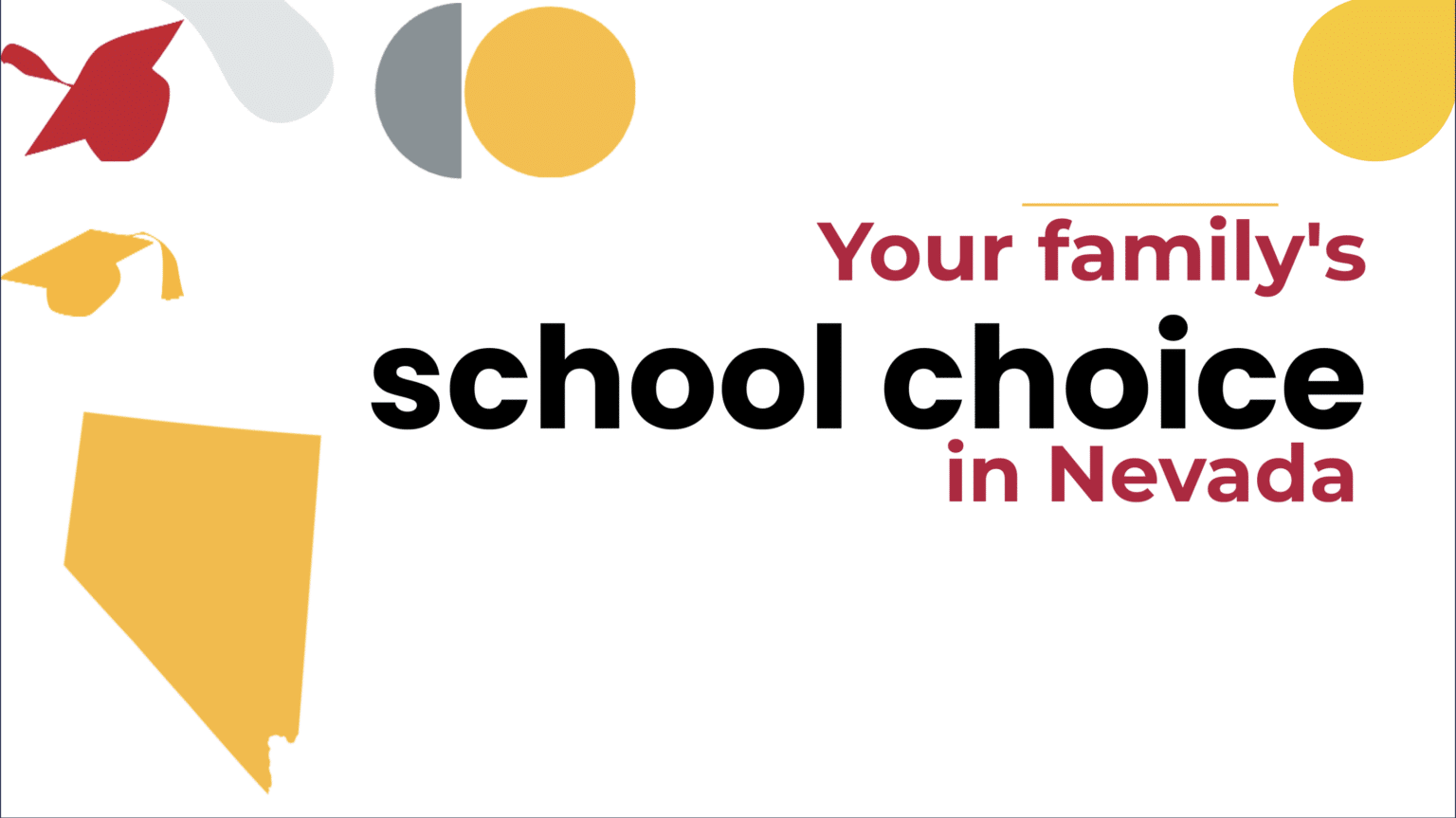Choosing a school? You’ve got options.
No pressure, but education is a big decision! After all, it has a huge impact on your child’s future. Fortunately, Nevada families have access to several K-12 options. Navigating these school choice options can help you find a school where your child thrives. This post will breakdown the main types of schools and provide some extra education resources.
In Nevada, families can choose from traditional public schools, public charter schools, public magnet schools, private schools, online learning, homeschooling, and microschooling and mix-and-match learning.
Looking for special education options? You can learn what special education services are available in Nevada at the Ultimate Guide to Special Education.

- Traditional Public Schools
- Public Charter Schools
- Public Magnet Schools
- Private Schools
- Online Schools
- Homeschool
- Microschooling
Traditional Public Schools
First off, you can choose traditional public schools, the most common school choice. In fact, 63.6% of all of K-12 students in Nevada attend a traditional public school. These schools are operated by school districts, free to attend, open to all students, and funded by federal, state, and local government. Did you know that Nevada spends an average of $10,450 per public school student each year?
Each state has its own open enrollment policies. Open enrollment refers to whether parents can send their children to any public school, regardless of where it is located. In Nevada, each district creates its own open enrollment policies; so, you should check with your local district if you would like to transfer your child. If your assigned school participates in open enrollment, it may cover transportation costs.
For an example of the transfer process and timeline in Nevada, check out Clark County School District’s change of school assignment application. Open enrollment is an important form of public school choice, widening parents’ options and ensuring that their zip code isn’t the sole determiner of their education.
Find out more about public schools in your state at the Nevada Department of Education. You can also learn more about Nevada open enrollment at “Public Schools Without Boundaries: A 50-State Ranking.”
Nevada Charter Schools
Families in Nevada can also choose public charter schools. In Nevada, 13.1% of all K-12 students attend a public charter school. Like traditional public schools, charter schools are public, free, and usually have no requirements for entry. What distinguishes charter schools is they have extra freedom to innovate with learning methods and are accountable to authorizing bodies for results.
Nevada has about 90 charter schools families can choose from. Each school has a charter which explains the school’s purpose and what specific community need it serves. That could be providing a STEAM program or offering a rigorous, literacy-based curriculum. If there are more families seeking admittance to a charter school than there are seats, a lottery system (like drawing random names out of a hat!) is often used to determine admittance. In Nevada, public charter schools don’t currently receive state transportation funding, so in many cases families must transport their charter students.
Free transportation may be available to some students in Nevada. If transportation is not provided, schools must collaborate with parents to find a solution. Students with special needs who have an Individualized Education Program (IEP) are eligible to receive transportation assistance.
A great resource for learning more about charter schools is the Charter School Association of Nevada.
Nevada Magnet Schools
You can also choose magnet schools! In Nevada, 13% of all K-12 students attend a public magnet school. Magnet schools are free public schools that allow kids to focus on specific themes, like STEM, health sciences, or the arts. A Las Vegas Sun article once described magnet schools as “schools within schools.” In other words, they offer specialty tracks within the public school system. So, these can be a valuable option for children who learn best when diving deeply into a particular course of study.
Nevada has several magnet schools throughout the state; for instance, there are more than 35 magnet schools or programs in the Clark County School District. One of these, Southeast Career Technical Academy, was voted the best magnet school in America in 2022! The district is opening an additional career-focused magnet school in 2023: Northeast Career and Technical Academy. Besides career tech, the district’s magnet schools have focuses that range from the performing arts to STEM to hospitality and tourism. Another large district with magnet schools is the Washoe County School District.
Nevada Private Schools
Nevada’s private schools take many forms, from Catholic parish schools to non-sectarian Montessori schools. All private schools are nonpublic schools that charge tuition.
There are more than 170 private schools across the state of Nevada. The average tuition for private schools in the state is $10,544 for elementary schools and $11,407 for high schools. Private schools in Nevada provide the same number of days of instruction and private school teachers must hold a teacher’s license or meet another requirement.
In 2015, Nevada launched a school choice program that enables families at or below 300% of the federal poverty line ($83,250 for a family of four in 2022-2023) to apply for scholarships for private education. Currently, 0.3% of all K-12 students participate in this program. If you think a private school could be the best fit for your child, you can also reach out to the school about whether any privately funded scholarships are available.
Learn more at Catholic Schools of the Diocese of Reno and Private School Review: Nevada.
Nevada Online Learning
Don’t overlook online learning. It offers a uniquely flexible learning environment that meets a variety of family needs. Whether your child wants to accelerate his or her learning or needs a quieter, stress-free environment in which to focus, you may wish to try virtual school.
Nevada offers several free, full-time online learning options, some of the largest of which are Nevada Connections Academy, Nevada Learning Academy, Leadership Academy of Nevada, and Nevada Virtual Academy. The Nevada Department of Education provides a complete list of distance learning options, some of which are district-specific and some of which are open to students across districts. Some of the full-time options operated by specific districts include North Star Online School in Washoe County, Pioneer Academy in Carson City, and Northeastern Nevada Virtual Academy in Elko County.
Odyssey Charter School is a hybrid option for K-12 students that may benefit from face-to-face sessions once a week.
To read more about online learning in Nevada, check out the Digital Learning Collaborative’s state profile.
Nevada Homeschooling
Homeschooling is another school option for Nevada families. This choice is especially suited to those looking for a hands-on, highly customizable learning experience. Homeschooling is the process of parents educating students at home and is permitted in all 50 states.
In Nevada, 5.7% of all K-12 students are homeschooled. The state requires a notice of intent to homeschool before you start and no later than 10 days after withdrawing from a school (it is required that you formally withdraw from your public school). In the case that you decide to return to public school, your student’s placement may be subject to testing and review of their work.
If you choose homeschooling, you’re required to teach specific subjects (including language arts, mathematics, science, social studies, and health), but specific standardized tests are not required. Your homeschooled student might still be eligible to participate in sports or activities at the local public school. Plus, homeschoolers with special needs are eligible to receive special education services from local school districts.
You may also want to check out the Nevada Department of Education – Homeschooling, Home School Legal Defense Association – Nevada, Nevada Homeschool Network, Nevada Moms, and RISE Education Resource Center.
Nevada Microschools and Mix-and-Match Learning
Today, many Nevada families are blending school options to come up with new ways to personalize education. Microschools are one of these ways. A microschool refers to students gathering together in a small group – with adult supervision – to learn, explore, and socialize. Microschools can take a variety of shapes and legal forms, from homeschoolers coming together at an enrichment center to a private school committed to small classrooms. What microschools share in common is a commitment to small-group learning and close-knit relationships, along with an emphasis on children as individual learners.
Here are real examples of microschools and related resources in your state:
- The National Microschooling Center is based out of Las Vegas and offers a plethora of resources for families and educators interested in microschooling. MicroschoolingNV is the National Center’s local partner.
- Hope Academy is a microschool and homeschool co-op based in Carson City that offers à la carte courses.
- Also, Nevada Action for School Options has created a series of explainer videos on microschooling.
- The Rainbow Room is a part-time, full-day drop-off program for homeschoolers in Las Vegas.
- Mission Possible Montessori provides Montessori education for children from preschool to 6th grade in Las Vegas.
- Desert Peach Montessori, an affiliate of Wildflower Schools, offers Montessori education to preschool and kindergarten students in Reno.
- Bloom Academy is the first and only self-directed microschool learning center in Las Vegas.
- Nevada School of Inquiry is an inquiry-based learning microschool in Las Vegas.
- The Learning Outpost is a project-based homeschool learning center founded by a teacher.
Remember, microschooling is more a mentality than a specific legal distinction in most cases. Often, a family participates in a microschool while legally homeschooling, or being enrolled in a private or online school.
Search for Schools Near Me
Learning Pods
How can it empower parents and help kids achieve their dreams?
7 Step Guide
Tips to help you find a school where your daughter or son will learn, succeed, and be happy.
Education Resources for
Nevada Parents
For additional information about school choices in
Nevada, visit these resources:
Every state is different when it comes to school choice options.
Sign up below to get a detailed comparison:
"*" indicates required fields
